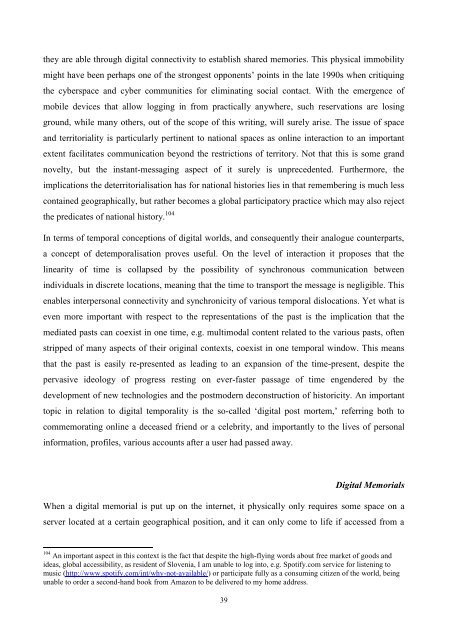UNIVERSITY OF NOVA GORICA GRADUATE SCHOOL ...
UNIVERSITY OF NOVA GORICA GRADUATE SCHOOL ...
UNIVERSITY OF NOVA GORICA GRADUATE SCHOOL ...
You also want an ePaper? Increase the reach of your titles
YUMPU automatically turns print PDFs into web optimized ePapers that Google loves.
they are able through digital connectivity to establish shared memories. This physical immobility<br />
might have been perhaps one of the strongest opponents‘ points in the late 1990s when critiquing<br />
the cyberspace and cyber communities for eliminating social contact. With the emergence of<br />
mobile devices that allow logging in from practically anywhere, such reservations are losing<br />
ground, while many others, out of the scope of this writing, will surely arise. The issue of space<br />
and territoriality is particularly pertinent to national spaces as online interaction to an important<br />
extent facilitates communication beyond the restrictions of territory. Not that this is some grand<br />
novelty, but the instant-messaging aspect of it surely is unprecedented. Furthermore, the<br />
implications the deterritorialisation has for national histories lies in that remembering is much less<br />
contained geographically, but rather becomes a global participatory practice which may also reject<br />
the predicates of national history. 104<br />
In terms of temporal conceptions of digital worlds, and consequently their analogue counterparts,<br />
a concept of detemporalisation proves useful. On the level of interaction it proposes that the<br />
linearity of time is collapsed by the possibility of synchronous communication between<br />
individuals in discrete locations, meaning that the time to transport the message is negligible. This<br />
enables interpersonal connectivity and synchronicity of various temporal dislocations. Yet what is<br />
even more important with respect to the representations of the past is the implication that the<br />
mediated pasts can coexist in one time, e.g. multimodal content related to the various pasts, often<br />
stripped of many aspects of their original contexts, coexist in one temporal window. This means<br />
that the past is easily re-presented as leading to an expansion of the time-present, despite the<br />
pervasive ideology of progress resting on ever-faster passage of time engendered by the<br />
development of new technologies and the postmodern deconstruction of historicity. An important<br />
topic in relation to digital temporality is the so-called ‗digital post mortem,‘ referring both to<br />
commemorating online a deceased friend or a celebrity, and importantly to the lives of personal<br />
information, profiles, various accounts after a user had passed away.<br />
Digital Memorials<br />
When a digital memorial is put up on the internet, it physically only requires some space on a<br />
server located at a certain geographical position, and it can only come to life if accessed from a<br />
104 An important aspect in this context is the fact that despite the high-flying words about free market of goods and<br />
ideas, global accessibility, as resident of Slovenia, I am unable to log into, e.g. Spotify.com service for listening to<br />
music (http://www.spotify.com/int/why-not-available/) or participate fully as a consuming citizen of the world, being<br />
unable to order a second-hand book from Amazon to be delivered to my home address.<br />
39

















